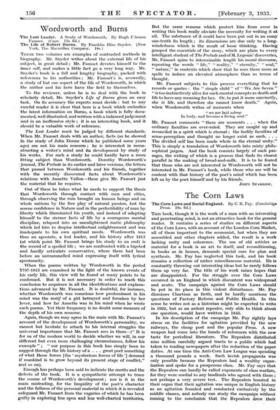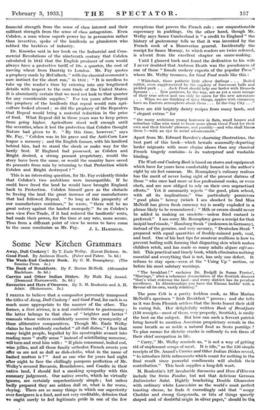The Corn Laws
Tars book, though it is the work of a man with an interesting and penetrating mind, is not an attractive book for the general reader. It contains a series of studies on different aspects' of the Corn Laws, with an account of the London Corn Market, all of them important to the economist, but when they are assembled and other chapters added, the result is a work lacking unity and coherence. The use of old articles as material for a book is an art to itself, and reconditioning, in books as in houses, demands special care for plan and synthesis. Mr. Fay has neglected this task, and his book remains a collection of rather miscellaneous material. He is constantly throwing out interesting ideas but he rarely follows them up very far. The title of his work raises hopes that are disappointed. For the struggle over the Corn Laws occurred in an England in which discontent was widespread and acute. The campaign against the Corn Laws should be put in its place in this violent disturbance. Mr. Fay dismisses Chartism as froth, and he hardly mentions the questions of Factory Reform and Public Health. In this sense he writes not as a historian might be expected to write in 1932, but as an ardent repealer, only able to think about one question, would have written in 1845.
In his description of the campaign Mr. Fay rightly lays stress on the facilities for agitation provided by the new railways, the cheap post and the popular Press. A new weapon had come into the hands of reformers with the new taste for periodical literature. The Repeaters distributed nine million carefully argued tracts to a public which had taken to reading newspapers after the reduction of the, paper, duties. At one time the Anti-Corn Law League was spending a thousand pounds a week. Such lavish propaganda was only possible because the Repeaters had a wealthy organ- ization and spoke for a prosperous class. Mr. Fay says that the Repeaters can hardly be called exponents of class warfare, for they were cordial to any landlords who agreed with them ; not perhaps a very severe test. The Repeaters boasted in their organ that their agitation was unique in English history as an agitation founded and conducted exclusively by the middle classes, and nobody- can study the campaign without coming to the conclusion that the Repeaters drew their
financial strength from the sense of class interest and their militant strength from the sense of class antagonism. Even Cobden, a man whose superb power lay in persuasion rather than invective, spoke of the landlords as plunderers who robbed the beehives of industry.
Dr. Knowles said in her book on the Industrial and Com- mercial Revolutions of the nineteenth century that Cobden calculated in 1845 that the English producer of corn would always have a protective tariff of 10s. a quarter, the cost of moving wheat from Dantzig to London. Mr. Fay quotes a prophecy made by McCulloch, " with the classical economist's sure instinct for the short run," in 1541: " It is needless to take up the reader's time by entering into any lengthened details with respect to the corn trade of the United States. It is abundantly certain that we need not look to that quarter for any considerable supplies." For ten years after Repeal the prophecy of the landlords that repeal would ruin agri- culture looked absurd ; so did the prophecy of the Repealers that Repeal would bring a material reduction in the price of food. What Repeal did in those years was to keep prices from going higher. Agriculture stood well enough until the seventies, when it lost the protection that Cobden thought Nature had given to it. " By this time, however," says Mr. Fay, " Cobden was in his grave and the Anti-Corn Law league a memory ; and the English farmer, with his landlord behind him, had to stand the shock or make way for the hardy Scot. If England had possessed, as Cobden and Bright desired, a strong peasant proprietary, would the story have been the same, or would the country have saved its peasants from ruin by returning to that Protection which Cobden and Bright destroyed ? "
This is an interesting question, for Mr. Fay evidently thinks that Cobden's two ambitions were incompatible. If he could have freed the land he would have brought England back to Protection. Cobden himself gave as the obstacle to freeing the land the great increase of our manufactures that had followed Repeal. " So long as this prosperity of our manufactures continues," he wrote, " there will be no great outcry against the landed monopoly." So on Cobden's own view Free Trade, if it had reduced the landlords' rents, had made their power, for the time at any rate, more secure. Thus from a different point of view he seems to have come to the same conclusion as Mr. Fay. J. L.





































 Previous page
Previous page